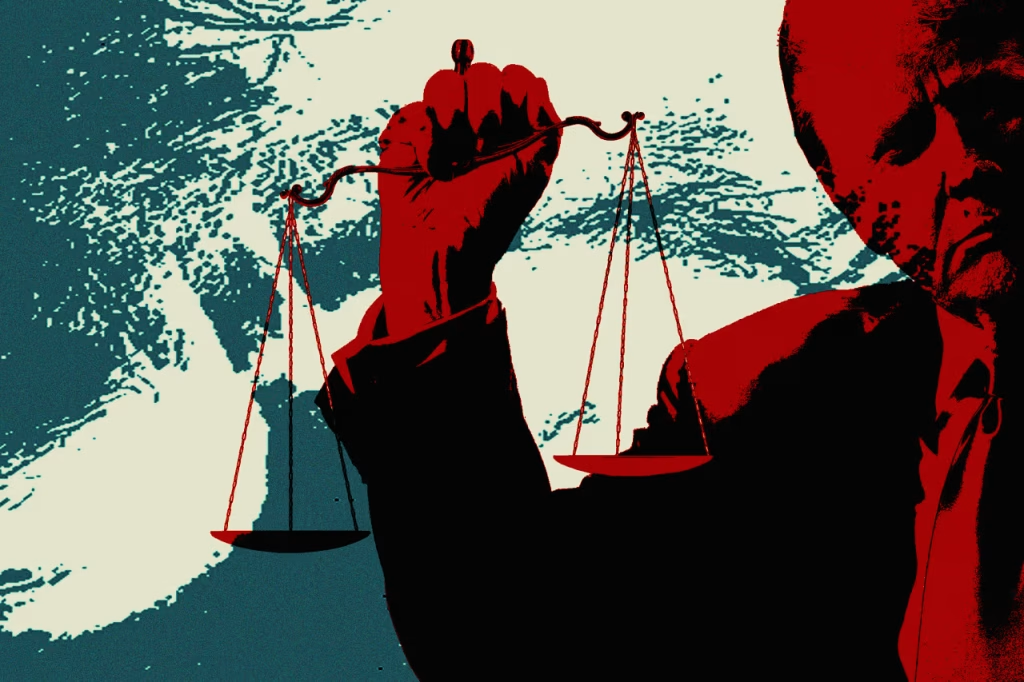Trump’s Plans to Use Justice Department for Vengeance
A chilling feature from the Wall Street Journal.

Alex Leary and Sadie Gurman for WSJ (“Trump Plans Massive Shake-Up of Justice Department“):
Donald Trump has promised immediate action on illegal immigration and oil drilling, but behind the scenes, his campaign has begun work on his most personal priority: tearing up the Justice Department.
Nothing has motivated or infuriated Trump more than his relationship with the agency. He is determined to remake it in ways that excite firebrands in his base—by replacing career employees with loyalists, by ordering investigations into those who have prosecuted him and by enlisting the Justice Department on the conservative side of the latest culture wars.
“OUR JUSTICE SYSTEM IS CORRUPT AND DISCREDITED, especially as it pertains to the 45th President of the United States, Donald J. Trump,” he recently said in a statement, accusing the Biden administration of mishandling investigations into the two attempts on his life. The Justice Department and the Federal Bureau of Investigation, he alleges, have been “obsessed with ‘Getting Trump’ for so long.”
Rarely a week goes by without Trump excoriating the justice system. He has converted his personal legal problems—which have greatly diminished at the federal level and in Georgia, though he was convicted in New York—into a Republican Party agenda and fundraising behemoth. Overall, many in the GOP agree that the department’s pursuits have grown political in nature, making conservatives a target.
But Trump has repeatedly signaled he could seek retribution against his perceived enemies. This has alarmed many Americans, including some former supporters who think Trump during a second term would be savvier and more determined to bend the institution to his whims. Trump has said winning in November would be his form of retribution.
This is an interesting report in that it’s not exact news. The story isn’t triggered by any recent development but rather an aggregation of similar statements Trump has made over months, if not years. But it rightly highlights a great danger should he regain the reins of the Executive branch.
Interestingly, while it’s the most prominent domestic politics story on the home page of the WJS website—and, indeed, might well have been the top actual news story were it not for the late-breaking news of the killing of Hezbollah leader Hassan Nasrallah—it’s nowhere to be seen on the front page of the print edition.


It’s possible, I suppose, that it was going to be in the space where the late-breaking Nasrallah story was and scratched in a rush to get the print edition out. But I digress.
Trump says a lot of crazy things. However, his first presidency demonstrated that he generally lacked the attention span and organizational acumen to actually implement most of his policies. But he’s signaling that he wants to remove the structural guardrails if he gets another go at it.
Trump and his allies have been considering candidates for attorney general who share his expansive view of presidential authority and would be more willing to do the White House’s bidding. President Biden and other presidents before him have sought to portray the Justice Department as independent of politics, taking pains to avoid even the appearance of seeking favor with the nation’s top cop.
Trump wants a loyalist, people familiar with his thinking said, and he has openly expressed regret over his choices in his first term, Jeff Sessions and William Barr. Sessions stepped aside from the department’s probe of the 2016 Trump campaign’s ties to Russia, angering the president, and Barr refused to pursue Trump’s baseless claims of voter fraud in 2020.
Among those under consideration to lead the department in a second Trump term are John Ratcliffe, who served under Trump as director of national intelligence; Sen. Eric Schmitt of Missouri, a former state attorney general; and Sen. Mike Lee of Utah, according to people familiar with discussions. These talks have included informal musings by Trump, who has mentioned Arkansas Sen. Tom Cotton.
Trump is also fond of some state attorneys general, including Andrew Bailey of Missouri and Kris Kobach of Kansas, who have filed lawsuits challenging Biden administration policies. Advocates of Mark Paoletta, former general counsel of Trump’s Office of Management and Budget, have personally pitched him to Trump.
“No decisions have been made on who will serve in a second Trump administration,” campaign spokeswoman Karoline Leavitt said. “President Trump will choose the best people at the appropriate time.”
Presumably, a Democratic Senate would refuse to confirm some of these choices. But everyone from Sabato’s Crystal Ball to Cook Political Report to 270toWin forecasts a slim Republican majority. Indeed, the only path to a Democratic hold is for Jon Tester to defy odds and keep his seat in Montana. And even that would yield a 50-50 tie that could be broken by J.D. Vance. While Senate Republicans have show more spine than their House counterparts in standing up to Trump’s excesses, I suspect they would not do so on cabinet picks.
As to Trump’s delusions that the Biden DOJ is being used as a partisan tool,
Attorney General Merrick Garland, who has sought to steady the institution after the rocky Trump years, and other officials have rejected accusations that the department is unfairly going after Republicans, pointing to recent criminal cases against Democrats, including President Biden’s son, Hunter, and this week’s indictment of New York City Mayor Eric Adams.
Still, the potential for it being used that way is obvious. As Trump demonstrated over and over again in his first term, we rely an awful lot on norms rather than laws to check the abuse of executive power.
Trump has long believed an attorney general should be more like his personal lawyer than an independent law enforcer. During his first term, Trump roiled the Justice Department by pressuring his attorneys general to punish his rivals and show leniency to his allies. His next attorney general will likely get the toughest treatment yet, former administration officials said. A landmark July Supreme Court ruling giving presidents broad protection from prosecution for actions they take while in office, including directions to Justice Department officials, could make it easier for him to get what he wants.
Vice President Kamala Harris, in a deadlocked race with Trump, has cited that decision in arguing he will go after political enemies. “Just imagine Donald Trump with no guardrails,” she said during an event this month.
“It’s certainly his character to seek vengeance,” said former Trump White House lawyer-turned-critic Ty Cobb. He said, however, it is possible that Trump’s advisers could moderate any desire for retribution. Trump at the end of his first term tried to install as attorney general an official who was willing to work with him to challenge the election results, a plan that crumbled when several senior Justice Department officials threatened to resign.
Trump was a rank amateur in 2017. Presumably because he didn’t actually expect to win, he had done no work in putting together a team before his surprise election victory in November and then blew up what little transition work had already been done. While the Republican bench was thin because so many officials with experience in the Bush administration had signed Never Trump letters, he nonetheless was forced to rely on whomever was still available. Many of them, it turned out, had at least some principles.
That wouldn’t be the case in a second presidency. There is now a deep bench of committed Trumpers. They may not have much experience or know what they’re doing but they’re loyal to him and scoff at norms and guardrails. Indeed, the very notion that he shouldn’t be able to enact every whim is anathema to them.
Trump has sought overhauls at the Justice Department ever since the FBI probe into whether his campaign worked with Russia to meddle in the 2016 presidential election, an investigation that spurred the appointment of a special counsel. Robert Mueller’s probe dogged Trump’s presidency, but Mueller didn’t find a criminal conspiracy.
The former president has been criminally charged in two more special counsel investigations during the Biden administration. One is related to the retention of classified documents after he left the White House, a probe that included a search of Trump’s Mar-a-Lago compound that was widely condemned by Republicans. The other stems from his efforts to overturn his 2020 election loss and the Jan. 6, 2021, attack on the U.S. Capitol by his supporters. Trump has promised to pardon many who were in the mob that day, claiming they are political prisoners. This month, he threatened jail time for anyone caught cheating in the election.
Some Republicans have suggested getting rid of the special counsel system, designed to limit political interference in sensitive investigations, a move that would give Trump appointees direct control of politically charged cases. At the same time, Trump has signaled he wants to appoint his own prosecutor to investigate the Biden family and pursue other political grievances.
“There needs to be a housecleaning on day one,” said Mike Davis, a legal activist close to Trump.
Many Republicans say they have lost trust in what they see as a justice system that is stacked against Trump and his supporters.
“Successful reform will require more than minor peripheral adjustments. It will require a holistic, energetic, leadership-driven effort to remedy the damage that has been done and advance the national interest,” Gene Hamilton, a former Trump Justice Department official, wrote in Project 2025, a blueprint produced by the Heritage Foundation for future Republican administrations.
Trump has disavowed the project after Democrats turned it into a boogeyman on the campaign trail, but a number of the proposals for the Justice Department align with Trump’s thinking. Heritage and other groups have compiled lists of potential employees for a new Trump administration. Trump has talked about using a program to remove job protections for civil-service workers.
I give a lecture on our national security decisionmaking system to our ~220 students every September and, for the last several years, have included a line to the effect that “what some call the Deep State, others call national security professionals.” In the several two-hour seminars that follow, I highlight the many institutional barriers to Presidents being able to enact their policy preferences. Throughout the government, and not just the national security space, career officials work hard to ensure that the laws are followed and to push back against decisions that, in their expert judgment, would be bad for the country or, at least, the organization’s mission.
Presidents of both parties have long railed against this system because, in their view, the American people have given them a mandate to carry out their policy preferences. Trump appears willing to do whatever it takes to remove these guardrails, most of which are norms-based but some of which are embedded in the laws that create and fund the executive branch apparatus. A Republican Congress (which we’ll almost certainly have if Trump is elected) and friendly Supreme Court may well go along with this.
Moves Trump has suggested include giving political appointees at the Justice Department greater oversight of the FBI, including its traditionally independent director, shrinking the size and power of its Washington headquarters and affording more resources instead to agents in the field. Some allies have suggested reviewing all of the FBI’s investigations and terminating those they find objectionable.
People familiar with Trump’s policy goals said he would give priority to religious rights over LGBTQ protections and that he would go after what they see as a left-wing ideology that drowns out other voices on college campuses.
The latter is sufficiently vague as to defy commentary. But, certainly, having the President or his hand-picked team deciding who the FBI investigates is something out of a banana republic.
Former Trump Justice officials predict he would put an end to broad investigations of local police departments for civil-rights violations, an approach that was a hallmark of the Biden administration, and instead endorse tough tactics to crack down on violent crime. According to statements that have been posted on Trump’s campaign website, under his Justice Department, federal prosecutors would seek to punish progressive local district attorneys who have embraced lenient policies like sending nonviolent drug offenders to treatment instead of jail.
Again, this would be an outrageous abuse of power. Ordinarily, one would expect a conservative Supreme Court to smack down such egregious federal overreach; I have no confidence this Court would do so.
In late August, special counsel Jack Smith filed a revised indictment accusing Trump of trying to undo his 2020 election loss, saying the case remains largely intact even after the Supreme Court’s immunity ruling.
“Keep your filthy hands off me,” Trump wrote in a fundraising email. “I already beat the impeachments and sham witch hunts! Now, they’re after me again with another HOAX. BUT I WILL NEVER SURRENDER!”
Rather obviously, this case would go away were Trump in charge of the DOJ.
Yes, this isn’t really news in the sense that it’s new. He has been saying this for a long time. He is really a sales and marketing guy and has no ability to organize the DOJ for what he wants but he has tons of help. The 2025 guys, the ones Trump is pretending to back away from, along with the Federalist guys will sort it out for him. In a normal world this would turn off at least some of his voters, but since it’s a cult (of personality) this stuff is a feature and not a bug.
Steve
Steve
@steve: There’s a strong authoritarian side to the MAGA coalition and a resentment that the Deep State is standing in the way of getting things done.
I don’t agree that Tester is the only path for a 50-50 Senate. Nebraska, Florida and Texas are in play. I do agree that the Dems chances are less than 50-50, but there are other paths besides Tester.